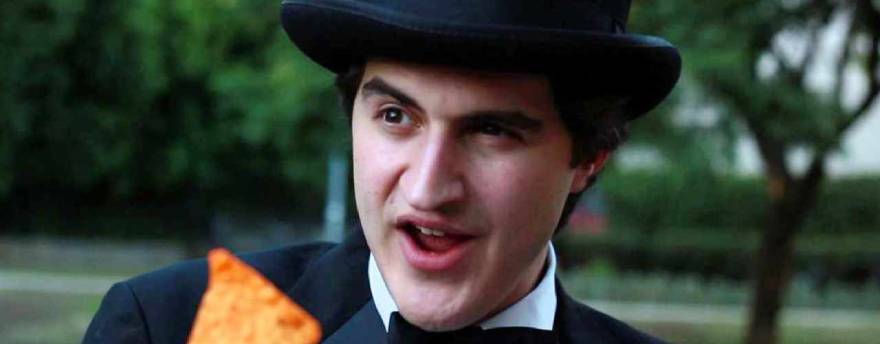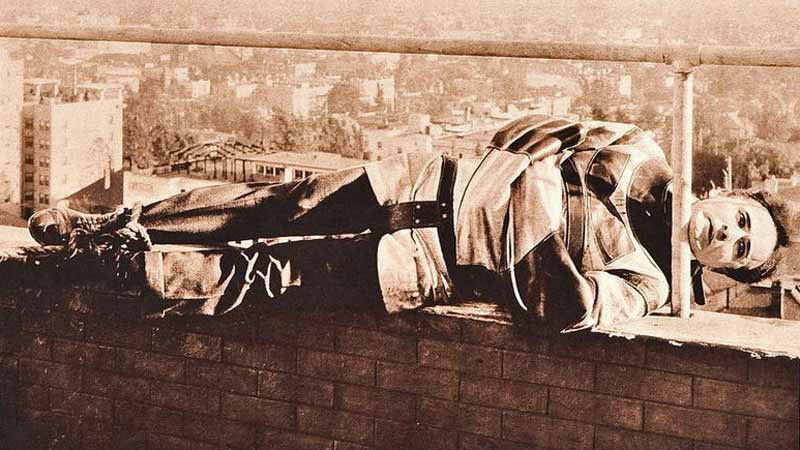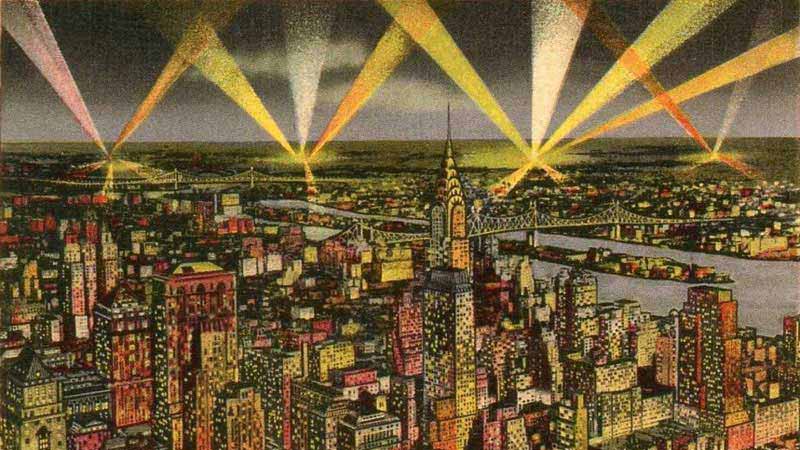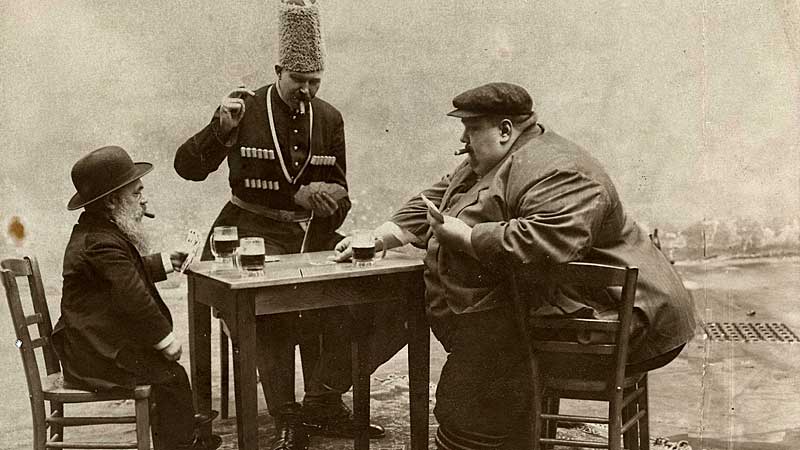Harrison Lampert's "Make Yourself a "Commercial" Success" Podcast Interview
by Christian Painter and Roland Sarlot

What We'll Explore
Harrison Lampert shares the ins and outs of commercial acting including agents, submissions, reels, pay, auditions, and being honest.
Who is Harrison Lampert?
You might know L.A. magician Harrison Lampert from a viral magic video in which he garnered over 30 million views. He is a graduate of the prestigious Groundling school for comedy and alumni of the Groundling Sunday company. He is a professional actor having appeared on Ghosted, American Housewife, The Incredible Burt Wonderstone, and many commercials.
Running Time:
The following interview has been edited and condensed for clarity.
What you can do
You are welcome to share up to 500 words of the below transcript in a non-commercial purpose provided you credit and link back to our site like this: "The Magic Oracle Business Podcast".
The Interview
Christian Painter: On this episode of "The Magic Business Podcast"...
Harrison Lampert: And I would say this, especially in the sense of being prepared for things. A lot of people say, you gotta be in the right place at the right time. But it's being prepared for when the right time comes.
Christian Painter: Welcome to the Magic Business Podcast, where we share insightful and delightful inner secrets about the business of magic. This is where our magic professionals present their real-life experiences and some of their most guarded secrets to help further your career in the magical arts. I'm your host Christian Painter in partnership with the MagicOracle.Club, where you can hear all of our magic business podcasts. If you've ever wondered how to get on commercials or television, this is the podcast for you.
Harrison Lampert is a professional magician based out of LA. You might know him from a viral magic video in which he starred that garnered over 30 million views. He is a graduate of the prestigious Groundling school for comedy and alumni of the Groundling Sunday company. He is a professional actor having appeared on the show, Ghosted, American Housewife, and numerous other shows. He was in the movie, "The Incredible Burt Wonderstone," as an actor, and also performed a card trick in it. He has also been featured in many commercials, some of them as a magician. Welcome to the show, Harrison.
Harrison Lampert: Hi, thanks so much for having me.
Christian Painter: Well, I'm very interested in this interview because it's an odd subject for a lot of magicians, for a lot of performers. And here's what I'll tell you. I'll tell you what little I know, which is, I've seen quite a few magicians, in fact, even one here in town where I'm at, who has been on commercials. And I've sat around with people who said, “gosh, I wonder how you even get on commercials”. And now we have you who have been on many commercials and can give us the insight.
Harrison Lampert: I'll certainly do my best.
Christian Painter: Is it difficult to get on a commercial?
Harrison Lampert: Yes is the short answer.
Christian Painter: I like how... let's not put any candy coating on it. Let's get right to it, that's perfect.
Harrison Lampert: I mean, it's all, I mean, the industry itself is very difficult. There's a lot of different facets, especially in commercials. For example, one, getting a commercial agent, someone who's going to help submit you for commercials because it's very difficult more in a like a bigger city, for example. I imagine in a smaller city, you might be able to self submit for things. And you could still self submit, what I mean by self submit is you're on like LA Casting or Actors Access are two big sites where they post on casting posts, auditions, and stuff. And you can self submit, which means you're submitting for your own projects or what projects you hope to audition for.
Christian Painter: Okay. Wait a minute. So this is interesting. I can go to these sites. Is there a list of projects?
Harrison Lampert: Yeah. So I believe you pay for like kind of a membership type of thing where you pay for an account where they'll post projects and you just submit for them.
Christian Painter: I go on this website. I see, oh, they're auditioning for something and I think, oh, I can do that. Now, how am I going to submit? Do I submit some video of me doing it, or?
Harrison Lampert: So if you're submitting yourself, you'd have an account and your account will have your resume, your headshot. And if you have a reel, which is a bunch of clips of yourself on a video. So that'll all be on your account so you don't need to really add anything else. So that's unsolicited and for me anyway, in my experience, that's been much more difficult to get seen. On the other side, if you have representation, they're submitting you for things and most of the time casting will defer to them and your reps on bringing you in for stuff.
Christian Painter: What if, you know, I'm not there yet, but I want to make this connection. So who am I looking up?
Harrison Lampert: So I would say the first thing would be to look up if there are any commercial agents in your area. And those are agents who specifically focus on commercials because there are many different types of agents, literary, theatrical, commercial, voice over, for everything. And if you're looking to do commercials specifically, a commercial agent's the person you want to find. The thing to keep in mind is that when they ask for the material, I had it to give them. And it's a little bit of a double-edged sword because people want to see that you do stuff, but you can't always do stuff without those people. And so a lot of times you have to start, especially in this industry, a lot of it at the beginning and throughout the whole thing really is what can you make do by yourself or what are you doing to continue to make content?
Christian Painter: What do you mean by material that you have material to give them. Be specific. What do you mean?
Harrison Lampert: For example, when I went in to talk with my now commercial agents, they asked me to send them a reel. Now I had just gotten out of college so I didn't really have any professional credits.
Christian Painter: Now, wait a minute. I want you to be... because there's going to be some listeners who don't know what a reel is.
Harrison Lampert: Gotcha. So a reel is a video of clips that you've edited together showcasing your material.
Christian Painter: So as some people might consider to be a promo reel.
Harrison Lampert: Exactly. And so putting together a reel was super important because it's something you can show them just like a promo reel. So with an agent, they'll want to see a promo reel of you doing whatever it is that you do.
Christian Painter: What is a great first step to get into this?
Harrison Lampert: I think a good first step is, especially if you're not familiar with how any of it works is to sign up for a commercial acting class. There may be one in your area. I know like when I was... because I'm from Philadelphia, they had one. I saw it in the local newspaper, there was a company they taught commercial acting, voice over acting, stuff like that. It was helpful to know, okay, this is kind of how the room feels. This is how, if you go in for an audition, this is how you can slate. So you're getting those practices, all those things and start learning the terminology and understanding, okay, this is my mark, this where I stand, I slate to the camera and then I do it.
Christian Painter: If I want to be in a commercial, and because I'm thinking magic, I might be going the wrong direction because you're really going in as an actor first.
Harrison Lampert: Yes. And I'll give you an example. So I did a commercial for McDonald's where I played a magician, and they saw me and they saw a bunch of other magicians and we all went in and I actually, I have a very funny story. It was funny to me anyway, about the callback. But at the end of the day, we didn't have to do any magic in the role. It didn't need to be a magician. The whole thing was me just pulling a silk out of a hat, but it was already preset so I didn't need to do any magic but they wanted people who I guess had experience as a magician, knew how to present as a magician.
Cristian Painter: Understood. Okay.
Harrison Lampert: So yeah. So in a commercial, but the thing that they told me sold it was the improv that I did in the room and being able to do that was what got me the role. What happened was, we went in two at a time and I went in with this other magician. And I was, you know, depending on your region, depending on where you are and in LA it's a bit more relaxed in terms of what you wear, I was just wearing a sport coat, nice jeans and a button-down and this guy was in full magic regalia.
Christian Painter: Please, please describe what that means.
Harrison Lampert: I believe it was a purple velvet jacket with a bow tie tux. It was either velvet or sequins. It was one of the two. And he comes in, he has a big bag with all his props. And I came in there. I had a deck of cards in my pocket and we always do what's called a slate and a slate is introducing yourself. Usually, you say your name and they'll give you specifics on what they want you to slate with. And they said, can you slate and also tell us just a little bit about your magic experience.
And this guy goes first and he goes, my name is so-and-so, I've been doing magic for this many years and I specialize in the art of surprise and he just lit a flash paper and did an appearing cane which is in my mind too much because he just lit this big fire and these rooms are tiny and I was right next to him. I didn't know he was going to do that so he did surprise me. And I had just a deck of cards and I'm like, all right, I guess that's where we're going with this. So I said, hi, my name's Harrison Lampert. I've been doing magic for so and so years and I dabble in the art of cards and I just threw a card which got a laugh.
Christian Painter: Well, he was trying to win the day with magic and they're looking for an actor who maybe does magic.
Harrison Lampert: Yeah. And he also, it felt like he was trying...it almost felt kind of like he was overcompensating. He just overdid it and all they wanted was a slate. And then if you want to do something kind of crazy, save it for the audition.
Christian Painter: So there's a lot more to this than people realize. There's going to be a lot of… I think people think they're just going to walk in with a deck of cards and win the day.
Harrison Lampert: Sometimes you can. There's really no set way where it works because there are people who I've seen who aren't great actors, but they're great at cardistry and that's all the people we're looking for. And so there's no right answer. I'm just giving you from my experience because it also sometimes it comes down to just how you look.
Christian Painter: Let's talk a little bit about the money aspect. So this already looks like a lot of work. Am I gonna get a, you know, what can I buy? Can I get a Tesla? What can I do?
Harrison Lampert: I'm sure if you do like a few national commercials around Christmas time and the Super Bowl, you might be able to.
Christian Painter: Okay. So that's like the very top end in the commercial market so to speak.
Harrison Lampert: If like during Christmas, if you're in a commercial, you're usually making more per run than you would be during a different time of the year or the same with if you have a Super Bowl commercial, you'll make a bit more. So there's a few other things to break down in this.
Christian Painter: Yeah. Yeah. Please do because we don't know, like, do you just walk in and here's $2000 thanks for the commercial or how does it work?
Harrison Lampert: So that's one way to go. So there's union work and then there's non-union work. The pay scale is very different because the union makes sure that those that are working union jobs are paid appropriately. So let's say you book a non-union job, chances are high that no matter what role you have in this, whether it's usually a non-union job is not going to be a national commercial and a national commercial is a commercial that runs all over the country. If you get a non-union commercial, usually you get what's called a day rate. So you get paid for the day you work and then you get what's called a buyout. So they will pay you a lump sum of money and then that's it. You're done. You don't get any more money.
Christian Painter: And this is for the non-union.
Harrison Lampert: Correct.
Christian Painter: And what pay range would that be in let's say? Give me a range.
Harrison Lampert: It could be anywhere from a $500 buyout to a $2,000 buyout which if they run your commercial a bunch is not a lot of money. So then you get a union commercial and a union commercial it could still be local, regional, national. However, with union, you get what's called scale which is the base rate and you're looking at about maybe $900 to $1,200 or so for scale and that's for the day rate. And then you also get residuals. So residual means every time the commercial airs, you get a paycheck. So you can make a decent amount of money. Will you make that money? That is difficult to say because getting the commercial is the hard part because as soon as you get it, then you get to have fun and do the job which is what you're auditioning for is to do the job. And so when you get the commercial, obviously on set, you know, it's super important to, when you're on set, to be prepared for what they're expecting of you because they're on a schedule and you want to make sure that you are not hindering that schedule.
Christian Painter: And what do you mean by that? How am I gonna hinder it?
Harrison Lampert: Well, if you're not hitting your mark and your mark means where they tell you to stand. So if you come in and they'll need you because this is for camera, they need a very specific shot which means they want you to stand in a very specific place and then deliver the line in a specific way. So you need to be able to do that. And then they're going to want to shoot it a couple of times for either a variation or just as backups, and you want to make sure that you're able to hit it, deliver the line, hit it, deliver the line every time.
Christian Painter: And if you're doing a magic trick, I'm gonna guess that we expect that magic to work.
Harrison Lampert: Exactly.
Christian Painter: I think most magicians think they're just going to show up, do the trick, and wow them and you know, win the commercial and that's it. And you're telling us a lot of stuff that's got to go on. a lot of things we have to think about. Except in rare cases for like cardistry, it's probably going to be your acting that's going to win the day more than the magic trick.
Harrison Lampert: Yeah because I can do a double lift and so can most other magicians.
Christian Painter: Let me go back to the SAG-AFTRA thing for a moment. Is there any negotiations that's going on? I mean, if I do win the part so to speak, is this set kind of in concrete what's going to happen or can I negotiate a little bit?
Harrison Lampert: Usually when you get an audition, you will get an email from the casting going you have an audition. This is the date, this is the time. And also most auditions are the next day.
Christian Painter: If you want to be in these commercials, this is a whole other process.
Harrison Lampert: Yes. And, oh, sorry. I didn't answer your original question, which was about the negotiations. Usually when you get your ticket, when you get your auditions ticket which has all the information, it will say how much you're going to make. So you know how much you're going to make before you audition.
Christian Painter: With all this work is... because you've definitely said, here's all the work, getting this commercial, finally getting to the part where you win it. And if I have let's say, and I don't know exactly what that means when I say this so I'm sure you'll have to help me, but I have a fairly successful commercial. I have a good commercial that runs well in those initial things. So I could be getting cheques in the location of $1,500 a month or something like that?
Harrison Lampert: It can span from making, you know, $800 to then making four grand to then making $200. It fluctuates.
Christian Painter: Right. And as the commercial plays, you're gonna get a different check every month. Different amounts, so to speak.
Harrison Lampert: Yeah. And sometimes it's not necessarily per month, it's usually per every few weeks or something like that.
Christian Painter: Wow. This is really interesting stuff.
Harrison Lampert: It's a very interesting process because, and obviously, it's always a learning process. The landscape is changing with everything that's been going on now so a lot of auditions I've had are either a self-tape or we've been doing it over like a Zoom call.
Christian Painter: Harrison, we're coming near the end of the podcast and we're on the MagicOracle.Club. And because we are the Magic Oracle, in this moment, you're the Magic Oracle. So you're the person everyone wants to know the information. And I like to ask this question, it's a tough one. That is, I'm sure a lot of people come up to you and ask you, oh, how do I get in a commercial? And I'm sure that's not the best question to ask. What is the question you wish they would ask you?
Harrison Lampert: I think the thing I would say is a better question would be is, “how do I go about getting started in this or where do I go to get started in this?” Because that's going to lead you to the steps you need. We've barely scratched the surface of all this and there's a lot of things to go about not just the business side of things, but then also the performance side of things. There's two different sides that you need to start understanding to get into this type of stuff.
Christian Painter: They want to get to the end real quick and you're saying, no. You should be asking me where's the first step. Where's the door just to get into this room?
Harrison Lampert: It's not a quick process.
Christian Painter: A reoccurring theme I'm hearing in many of our business podcasts, which is be prepared before you get there. Like you were talking about already having that reel, already having something to show people before you walk in that room so to speak. And you know, I'm hearing that from a lot of, you know, the different business things that we talk about. And I hope the listeners are listening to that as well is if you don't have a reel, probably, let's not even go this direction yet. Correct?
Harrison Lampert: Yeah. And I would say, just start trying to put one together whether it's with material you'll shoot yourself. And I would say this too is, especially in the sense of being prepared for things, a lot of people say, oh, you gotta be in the right place the right time. It's being prepared for when the right time comes.
Christian Painter: Boom. Boom. I love it. That is right there. Right there I think there is the whole comment for the show. Harrison, we are out of time, but holy cow, this was fantastic. Thanks so much for being on the show.
Harrison Lampert: Of course. Thanks so much for having me. This was great.
Christian Painter: Thank you for listening to our Magic Business Podcast. Please visit the MagicOracle.Club where you can hear all of our business podcasts and enjoy a vast array of additional magical knowledge. I want to share with you one of my favorite quotes of Dai Vernon. "Magicians want to see artistic technique in an entertaining manner and the laymen simply want to be entertained. Magicians will accept all magic that is either technically good or entertaining or even both, but laymen will accept only magic that entertains."
As always, we at the Magic Oracle wish you continued success on your path in the magical arts.
A Jolly Genie?

The Magic Oracle is a FREE site but I still must pay dastardly server fees! Please, donate ANY amount... $1, $5, $10, why not $1 million?
THANK YOU for keeping magic alive... and me, a Jolly Genie!



